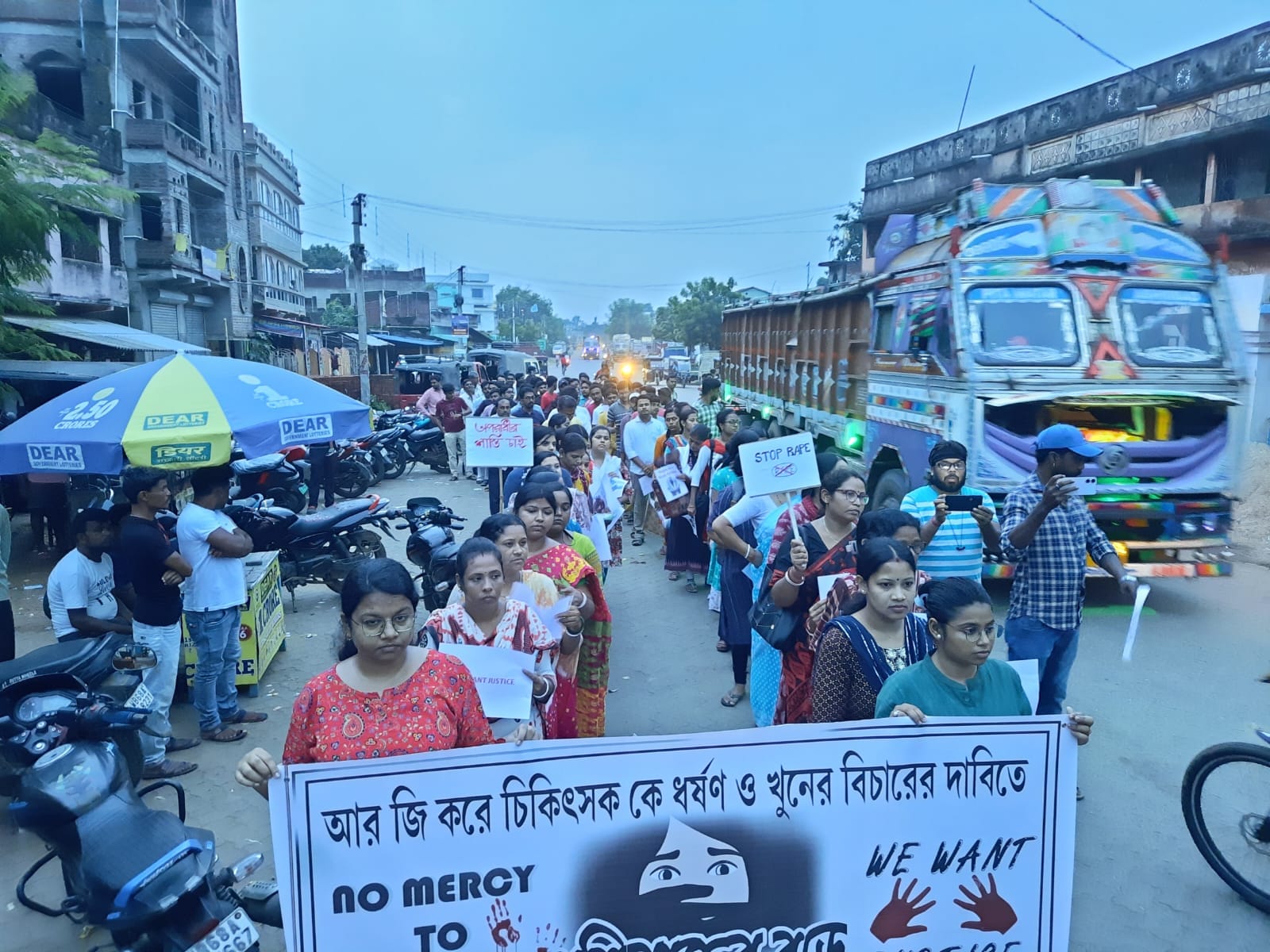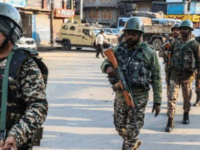KOLKATA HORROR ANOTHER DEMONSTRATION OF RULING CLASS’S HYPOCRISY–FIGHT BACK AGAINST SEXUAL VIOLENCE AND EXPLOITATION

Content warning: this article discusses sexual violence of an extreme nature and may be triggering.
The horrific rape and murder of Dr. Moumita Debnath has shocked the world and once again thrown the brutal rape culture of India into the global spotlight. Around the country, massive protests have broken out which, if yet falling short numerically of the Nirbhaya movement, have still demonstrated a qualitative breakthrough in the fight against sexual violence. Millions this week have taken to the street all across India: not only in West Bengal, not only in the major metropolitan areas but even in small villages as far away as Tamil Nadu. The Indian Medical Association has carried out a 24-hour strike, suspending all outpatient services in both public and private hospitals from 6am to 6am 17-18th August. Doctors, students, and everyday women and men are outraged at not only the gruesome nature of the case, but also the hypocritical and repressive response of the ruling class.
Dr. Debnath’s safety was undermined in multiple ways by both the hospital administration and the police. To begin with, at the time she was assaulted, she was resting in an empty conference room after working a grueling 36 hour shift – as there are no appropriate, safe and well-equipped rooms inside the hospital for doctors to rest between their shifts. At least one of her attackers was allowed to get into the building because of lax security regulations despite not having the proper credentials. CCTV cameras were installed but not available. In addition, the medical reports suggest that she was attacked not by one by multiple men, and the hospital’s rush to rule her death as a suicide was completely absurd. The police failed to seal off the area and the hospital itself clearly tampered with the evidence before and during the investigation, in the name of “renovation”.
Yet this is not even the only case of sexual abuse taking place at RG Kar Medical College and Hospital. Take the 2001 case of Soumitra Biswas, a student who threatened to expose a pornography ring in the university. It was an open secret in those days that a group of male students had been filming themselves having sex with prostitutes on campus and when they were not available, dead bodies from the hospital. According to student testimonies, Biswas was the only student who had confronted this racket after a photo of his batch mate’s face was superimposed over an image of a nude corpse. His death bore obvious signs of murder: the door to his room was forced open, a handkerchief was shoved down his throat, and the cord that he was strangled with was found to be too short for him to have hung himself. Yet the police ruled this a suicide, and despite discovering filming equipment in the adjacent room, no investigation was made into the allegations that were clearly echoed by other students of the college.
Dr. Sandip Ghosh, principal of the medical college, had been transferred twice in the last year, was relieved from Calcutta National Medical College due to corruption allegations, and was known to neighbors as a serial wife-beater. His connections to the TMC had saved him from disgraceful firing on multiple occasions, and upon his resignation from RG Kar following the backlash over his role (he was the one who hastily propounded the ‘suicide’ theory and engaged in outrageous victim-blaming comments), he was given a new cushy job within hours. Critics have labeled Dr. Ghosh as a corrupt bureaucrat who used mafia style tactics to maintain his own power in the medical profession.
Of course this situation is familiar to any woman who has worked in academia. Powerful men systematically abuse women and treat elite professionals as their own personal harem. Women who stand up to this often have no recourse, even through the police and judicial system, a system whose executors are often open and unapologetic about their corrupt dealings and power brokerage, a kind of babu system which protects the elite from the consequences of their own actions rather than protecting women and other vulnerable people from oppression and exploitation.
Dr. Debnath’s case was neither a freak event nor even an outlier. Every day in India and around the world, women are confronted with the reality of patriarchal rape culture; its insidiousness infects every aspect of life. Constantly looking over one’s shoulder to see if a man is following in a deserted place, worrying over whether a man’s smile is merely friendly or hiding sinister intent, having to “check in” with friends and share location data to stay safe on simple auto rides, having to ignore the misogynist, sexist and rapey comments of bosses, managers, supervisors, associates, coworkers, and classmates, having to follow curfews and stay in women’s-only hostels, train cars and schools, and despite all of this, still knowing that our bodies are able to be violated at any time. And when they are, still facing a torrent of victim-blaming comments and misogynistic justifications, and the sanitizing propaganda of the mainstream media—some of which still shamelessly and revoltingly refer to the odious crime in Kolkata as an “alleged rape”, even after an autopsy left no doubt that gang-rape took place.
Whether in public or behind closed doors, violent and abusive men roam free while women are punished with confinement, control and shame for the crime of merely existing. For example, at Banaras Hindu University, after a very prominent case of sexual assault, the university authorities, instead of increasing safety for women students and addressing the situation on campus decided to lock the women students in their tiny hostels, while the men who committed the assault were allowed to roam freely. What kind of message does this send to abusive and predatory men? That any woman you catch out of bounds is yours for the taking? That women’s bodies are trophy hunts to be pursued like exotic game?
As we all know, rape and sexual assault are not only the actions of depraved individuals, but a symptom of the patriarchal rape culture that has permeated to all parts of society. West Bengal itself has long been considered a secular safe haven for women in India, a myth that has consistently belied reality even to the present day. From Sandeshkhali and Presidency University to the closed doors of people’s homes, cases of violence and sexual abuse against women are rampant. Even more so, when these cases involve SC/ST women, they often do not even make the news. The BJP and TMC’s own abysmal record regarding cover-ups and protecting sexual abusers demonstrate that they only pretend to care about abuse when it is committed by the opposing party.
Babu culture not only gives dangerous men a backdoor into restricted areas where they can violate women, it also allows such people to escape from justice, whether they are given safe passage out of the country, freed from jail and adorned with garlands, or the evidence of their atrocities destroyed through the deployment of thousands of armed goons. Men need to address rape culture not by binding women into ever tighter prisons of cloth and concrete, but by being accountable, acting as allies, taking each other to task and teaching the next generation of boys that a woman’s body is no one’s but her own. We also must confront the fact that patriarchy and sexual violence are tools of upholding the social order of capitalism–and patriarchy can only be abolished in the context of the abolition of class society, a task only the working class can achieve.
ROSA India stands in solidarity with the victim’s family in their fight for justice. We support the demands of women and healthcare workers for increased security at hospitals, secure on-call rooms inside hospital premises in sufficient numbers, the installation of CCTV cameras, and more generally, better staffing and working conditions. However this cannot and should not be the end of it. Administrators and professors involved in sexual abuse or cover-ups should be barred from future recruitment at any public or private institution.
The movement must reject the divisions that have already emerged within itself, such as a march in Mumbai which prohibited Dalit women from joining. It is well known that Bahujan women are far more likely to be sexually assaulted, and that sexual abuse is a tool of control over oppressed castes. A serious and mature movement must go beyond hiding rape behind slum walls, and address casteism and communalism within its own ranks, including within the working class. A better future can only be won through an organized and sustained campaign that attacks sexual violence and femicide on all levels of society, including domestic, caste and communal abuse. Doctors, patients, students and teachers, and the entire working class needs to stand together. We urgently request for other unions to engage through speaking out and mobilizing solidarity strikes until demands are met, for students to organize walkouts and, if necessary, to occupy the campuses until demands for the safety of women students are met.
It is time to fight for change now. We cannot accept a slow, incremental loosening of the stranglehold around our necks. To wait is to accept our own deaths. We can, we must, and we will fight for our rights to safety and equality.
Yet the capitalist system and its inherent inequalities, championed by all mainstream parties in India, is not only incapable to address the root causes of gender-based violence; it actively reinforces them. This is a system that commodifies women’s bodies, ruthlessly exploits their labour, adjusts safety according to one’s means, and allows the rich, powerful and ‘well-connected’ to evade accountability. It is a system that must be dismantled root to branch if we are to create a world where all women can live free from fear.
To truly end rape culture, we must fight not only against individual perpetrators but against the entire social order that enables and excuses their actions. This means building a movement that is not just against rape and sexual violence, but for a complete transformation of society—a movement that is anti-capitalist, anti-patriarchal, and anti-casteist. The fight for justice for Moumita, and for all victims of sexual violence, is intrinsically linked to the fight for a socialist future —which ROSA is actively organising for, in India and many other parts of the world.





